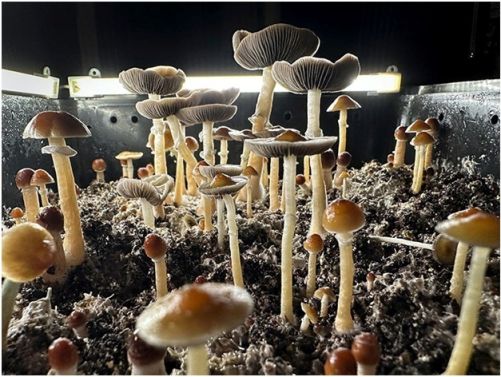Magic mushrooms, scientifically known as psilocybin mushrooms, have been a source of fascination and controversy for centuries. These psychedelic fungi have been used in various cultures for religious, spiritual, and recreational purposes. However, a myriad of misconceptions and myths surround magic mushrooms, leading to misinformation and misunderstanding. In this article, we will delve into the world of magic mushrooms, separating fact from fiction as scientists debunk common misconceptions.

Myth 1: Magic Mushrooms Are Always Dangerous
Reality: While the use of magic mushrooms does come with risks, it is essential to distinguish between abuse and responsible use. Psilocybin, the active compound in magic mushrooms, has shown potential therapeutic effects in various studies. Research suggests that controlled and supervised use may benefit mental health conditions like depression, anxiety, and PTSD.
Myth 2: Magic Mushrooms Cause Permanent Cognitive Damage
Reality: Contrary to popular belief, there is limited evidence supporting the notion that magic mushrooms cause permanent cognitive damage. Some studies even suggest that psilocybin may promote neurogenesis, the growth of new neurons in the brain. However, it is crucial to emphasize that the long-term effects of magic mushroom use are not yet fully understood, and further research is needed to draw conclusive results.
Myth 3: Magic Mushrooms Are Highly Addictive
Reality: Magic mushrooms are not considered addictive in the traditional sense. The compounds in these mushrooms do not lead to physical dependence. Research indicates that psilocybin may have the potential to treat substance abuse disorders, and help individuals overcome addiction.
Myth 4: All Magic Mushrooms Have the Same Effects
Reality: There are over 180 species of mushrooms containing psilocybin, each with varying concentrations of the compound. Different strains can produce different effects, and individual reactions may vary. Factors such as dosage, setting, and the user’s mental state play a crucial role in shaping the psychedelic experience.
Myth 5: Magic Mushrooms Are Illegal Everywhere
Reality: While many countries have strict regulations regarding the use of magic mushrooms, some jurisdictions have decriminalized or legalized their use for specific purposes. For example, the state of Oregon in the United States has legalised the therapeutic use of psilocybin under the guidance of trained professionals. The evolving legal landscape reflects a growing acknowledgment of the potential benefits and a shift in public perception.
Myth 6: Magic Mushrooms Are Only Used for Recreational Purposes
Reality: While magic mushrooms have a history of recreational use, their therapeutic potential is gaining recognition. Recent studies have explored the use of psilocybin in treating mental health conditions, including depression, anxiety, and PTSD. The medical community is increasingly exploring controlled and supervised use in therapeutic settings.
Myth 7: Magic Mushrooms Are Always Safe in Any Setting
Reality: While some studies suggest therapeutic benefits, it’s crucial to note that the set and setting play a significant role in determining the outcome of a psychedelic experience. Inappropriately timed or uncontrolled use in a non-supportive environment can lead to anxiety, panic, or even psychotic episodes. Responsible and mindful use is paramount for a positive and safe experience.
Myth 8: Magic Mushrooms Lead to Instant Enlightenment
Reality: Some individuals believe that consuming magic mushrooms will instantly lead to profound insights and spiritual enlightenment. While psilocybin can induce altered states of consciousness, the idea that it guarantees enlightenment is an oversimplification. The effects are highly subjective, and meaningful experiences often require integration and reflection over time.
Myth 9: Magic Mushrooms Are a Gateway to Harder Drugs
Reality: The concept of magic mushrooms serving as a gateway to more dangerous substances is not supported by scientific evidence. Research suggests that psilocybin use is not correlated with an increased likelihood of trying or becoming addicted to other drugs. Each substance has its own set of risks and effects, and the use of magic mushrooms does not inherently lead to the use of harder drugs.
Embark on a transformative journey with Shrooms Canada, your premier online dispensary and passionate advocate of psilocybin. At Shrooms Canada, we go beyond merely providing the finest Magic Mushrooms – we are on a mission to share the profound wonders of psilocybin with Canada and the world. Drawing from our team’s extensive knowledge and expertise in psilocybin and Magic Mushrooms, we have diligently scoured the country for the most exceptional sources of this extraordinary fungi. This commitment ensures that every product you purchase from us is of the utmost quality, reflecting our dedication to bringing the best of psilocybin experiences to our valued customers. Join us at Shrooms Canada as we strive to elevate the understanding and accessibility of Magic Mushrooms, fostering a community that embraces the transformative potential of these natural wonders. Explore the possibilities at https://shroomscanada.cc/.
As scientists continue to unravel the mysteries of magic mushrooms, it is crucial to approach the topic with an informed and open mind. Debunking common misconceptions allows for a more accurate understanding of the potential risks and benefits associated with the use of magic mushrooms. As research progresses, a clearer picture will emerge, guiding both policymakers and the public towards a more nuanced and responsible approach to these fascinating fungi.

